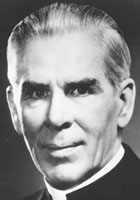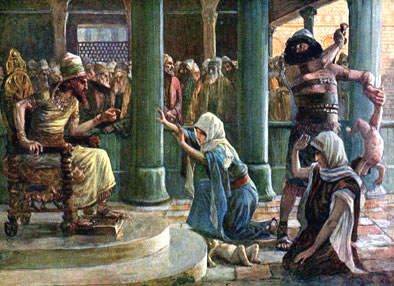Love and
Truth: A Plea for Intolerance
by Fulton J. Sheen
What is tolerance?
Tolerance is an attitude of
reasoned patience toward evil
and a forbearance that restrains
us from showing anger or
inflicting punishment. But what
is more important than the
definition is the field of its
application. The important point
here is this: Tolerance
applies only to persons, but
never to truth. Intolerance
applies only to truth, but never
to persons. Tolerance applies to
the erring; intolerance to the
error.
- quote by Fulton J.
Sheen, Old Errors and New
Labels (1931)
|
There
is no other subject on which the
average mind is so much confused as
the subject of tolerance and
intolerance. Tolerance is always
supposed to be desirable because it
is taken to be synonymous with
broadmindedness. Intolerance is
always supposed to be undesirable,
because it is taken to be synonymous
with narrow-mindedness. This is not
true, for tolerance and intolerance
apply to two totally different
things. Tolerance applies only to
persons, but never to principles.
Intolerance applies only to
principles, but never to persons. We
must be tolerant to persons because
they are human; we must be
intolerant about principles because
they are divine. We must be tolerant
to the erring, because ignorance may
have led them astray; but we must be
intolerant to the error, because
Truth is not our making, but God's...
Keeping the distinction well in mind between
persons and principles, cast a hurried glance
over the general religious conditions of our
country. America, it is commonly said, is
suffering from intolerance. While there is
much want of charity to our fellow-citizens, I
believe it is truer to say that America is not
suffering so much from intolerance as it is
suffering from a false kind of tolerance:
tolerance of right and wrong; truth and error;
virtue and vice; Christ and chaos. The person,
in our country, who can make up his mind and
hold to certain truths with all the fervor of
his soul, is called narrow-minded, whereas the
person who cannot make up his mind is called
broadminded. And now this false
broad-mindedness or tolerance of truth and
error has carried many minds so far that they
say one religion is just as good as another,
or that because one contradicts another,
therefore, there is no such thing as religion.
This is just like concluding that because, in
the days of Columbus, some said the world was
round and others said it was flat, therefore,
there is no world at all.
Such indifference to the oneness of truth is
at the root of all the assumptions so current
in present-day thinking that religion is an
open question, like the tariff, whereas
science is a closed question, like the
multiplication table. It is behind that queer
kind of broadmindedness which teaches that any
one may tell us about God, though it would
never admit that any one but a scientist
should tell us about an atom. It has inspired
the idea that we should be broad enough to
publish our sins to any psychoanalyst living
in a glass house, but never so narrow as to
tell them to a priest in a confessional box.
It has created the general impression that any
individual opinion about religion is right,
and it has disposed modern minds to accept its
religion dished up in the form of articles
entitled: "My Idea of Religion," written by
any nondescript from a Hollywood movie star to
the chief cook of the Ritz-Carlton...
The remedy for this broadmindedness is
intolerance, not intolerance of persons, for
of them we must be tolerant regardless of
views they may hold, but intolerance of
principles. A bridge builder must be
intolerant about the foundations of his
bridge; the gardener must be intolerant about
weeds in his gardens; the property owner must
be intolerant about his claims to property;
the soldier must be intolerant about his
country, as against that of the enemy, and he
who is broadminded on the battlefield is a
coward and a traitor. The doctor must be
intolerant about disease in his patients, and
the professor must be intolerant about error
in his pupils. So, too, the Church, founded on
the Intolerance of Divinity, must be equally
intolerant about the truths commissioned to
her. There are to be no one-fisted battles, no
half-drawn swords, no divided loves, no
equalizing Christ and Buddha in a broad sweep
of sophomoric tolerance or broad-mindedness,
for as Our Blessed Lord has put it: "He that
is not with Me is against Me"...
There are only two positions to take
concerning truth, and both of them had their
hearing centuries ago in the court-room of
Solomon where two women claimed a babe (1
Kings 3:16-28). A babe is like truth; it is
one; it is whole; it is organic and it cannot
be divided. The real mother of the babe
would accept no compromise. She was intolerant
about her claim. She must have the whole babe,
or nothing - the intolerance of Motherhood.
But the false mother was tolerant. She was
willing to compromise. She was willing to
divide the babe-and the babe would have met
its death through broadmindedness.
[Excerpt from the book, Moods
and Truths, by Fulton J. Sheen,
1932]
 |
Archbishop
Fulton
J. Sheen (1895-1979) was an
American theologian and bishop,
first in New York City and then
in Rochester, New York. He
became well-known for his
preaching, especially on
television and radio. He hosted
the night-time radio program The
Catholic Hour for twenty
years (1930–1950) before moving
to television and presenting a
weekly program called, Life
Is Worth Living. The show
ran from 1951 until 1957,
drawing as many as 30 million
people on a weekly basis. He
wrote 73 books and numerous
articles and columns. Mother
Theresa of Calcutta always kept
a copy of Sheen’s book, Life
of Christ, with her
wherever she travelled for daily
reflection and meditation.
|
* illustration above of The
Wisdom of Solomon, by Francois Tissot.
|

